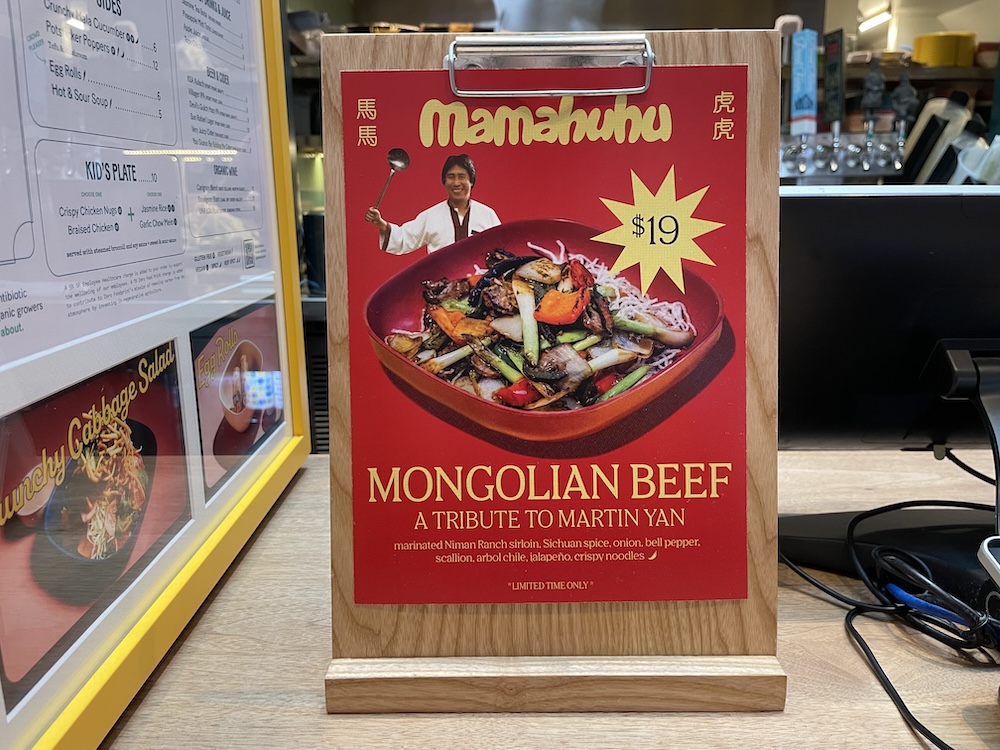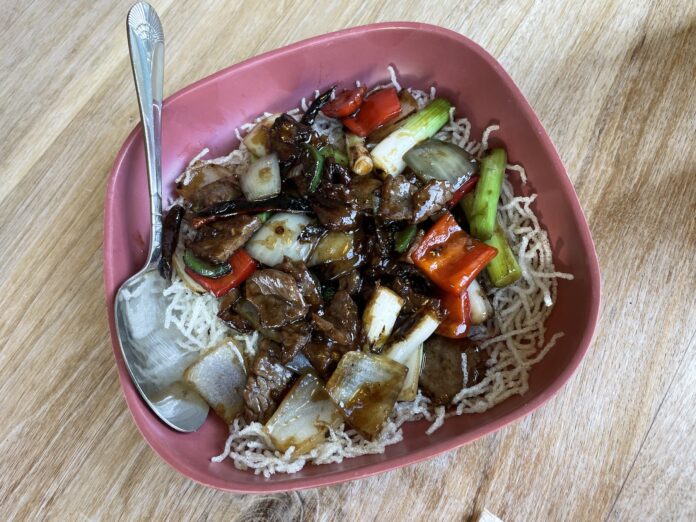Good Taste is a menu for eating well in the Bay Area. This week, we share a special conversation with TV culinary legend Martin Yan of Yan Can Cook fame and Brandon Jew, the acclaimed chef behind Mister Jiu’s and Mamahuhu restaurants. Mamahuhu is offering a Yan-inspired Mongolian beef dish through May 31 as an Asian American and Pacific Islander Month tribute.
I’ve met and interviewed Martin Yan a few times, and it’s always a thrill. But when he and Brandon Jew and I jumped on a Zoom call last week to talk about Mamahuhu’s Mongolian beef special, I had to properly fangirl over this pioneer. When I was a kid, I watched a lot of the local PBS station KQED, which we called Channel 9 in the pre-cable days, where I learned a lot about Chinese culture and cooking from watching his Yan Can Cook series.
“I grew up on you, Julia Child, Jacques Pépin, and Big Bird,” I told him. “You are legends!”
At 76, Yan still maintains a very active schedule. He has self-published two books this year—his 36th and 37th, respectively—and champions the Bay Area’s Chinese restaurant community via his KTSF series Wok Around the Bay and from giving tours of San Francisco’s Chinatown.
“I feel that it’s a responsibility to maintain Chinatown’s vibrancy and the business,” he said, “so I still do a lot of Chinatown tours. Not for money, but for all of the charity organizations.” He’s also been spotted in the Sunset supporting all the mom and pop restaurants at the Night Markets.
Yan notes that our Chinatown has a living population, as compared to the Chinatowns in other international cities that are mostly tourist attractions. But he does lament watching a lot of places in our Chinatown close, instead of being taken over by younger family members.
“I always hoped that a lot of the retired restaurateurs would bring in the next generation of their sons, their cousins, to open a restaurant,” he said. “But unfortunately, after they retire, not too many of the young people are taking over or continuing the business. So when Brandon opened Mr. Jiu’s, I was so excited to see there’s a new generation of chefs opening, trying to make it in Chinatown. It proved to me that if you are good at what you are doing and you are passionate, you become successful. So now Mr. Jiu’s is one of the very few Chinese restaurants in the country that has a Michelin Star. Look how successful Brandon is; he’s my mentor for business!”
“Martin is such an icon,” said Jew. “I just get so excited that I can access him and his energy. I’m trying to keep up with him all the time! His energy and his zest for Chinese food gets me excited and reminds me of the work that we still need to do to promote Chinese cuisine and Chinese culture in America. And really what he did in his era was much harder. He was the first one for us to really be a voice of our community. He was promoting Chinese food and having people understand us better [and] understand that we have a lot of similarities. A lot of things that we both enjoy, we can enjoy at the table.
“He means so much to our community,” he added. “I’m just really happy that we get to celebrate his work and the work he still does. I mean, Martin is busier than me! He’s out here in Chinatown. I see him on tours. When there’s events in Chinatown, he’s on stage, he’s getting people excited about coming to Chinatown and about Chinese food. He’s an amazing example of how to really be advocating for Chinese food, and for Chinatown.”

The Mongolian beef dish on the menu at Mamahuhu during AAPI Month is an opportunity to give Yan his flowers in a flavorful way. Jew said he was inspired by an old episode of Yan Can Cook and made a version by stir-frying marinated Niman Ranch sirloin with Sichuan spice, onion, bell pepper, scallion, arbol and jalapeño peppers and serving it over crispy rice noodles.
“This was a dish that we thought was going to really resonate with a lot of people,” he explained. “It’s a dish we don’t really have on the menu: a spicy beef dish. I think all of the alliums that are out right now in spring and the scallions are really great right now.
“And, yeah, I think the timing is also really great too, in a way of giving us another platform to really talk about what these tariffs are, what it means to a lot of the businesses here in Chinatown, and to have people remember how difficult that would be if those prices stay with those kind of percentages… it’s going to come back to the consumer and that might mean that people aren’t going to choose using some of these really important ingredients and things that a lot of people come to Chinatown for. People still know, when they are looking for unique Chinese ingredients for food or for even medicine, a lot of times they have to come to Chinatown for that. And I think it’s important to also remind people of what [tariffs’] effects could have on Chinatown.”
“Let me elaborate a little on this,” Yan said. “Everybody knows that when you have tariffs added to most of these items, we the consumers are paying for it, right? And I’ll also give an example: everybody knows that soy sauce, hoisin sauce, and sesame sauce are very important. Most of them are not manufactured here, some of them are manufactured here, but most of them are not. If the tariffs are higher, some of the restaurants will use lesser-quality ingredients, lesser-quality seafood. When everything is less quality, it actually diminishes the actual enjoyment of food and wine and tasting.”
Tamara publishes the California Eating website, newsletter, and zine, and has just launched the Food Book Club.





